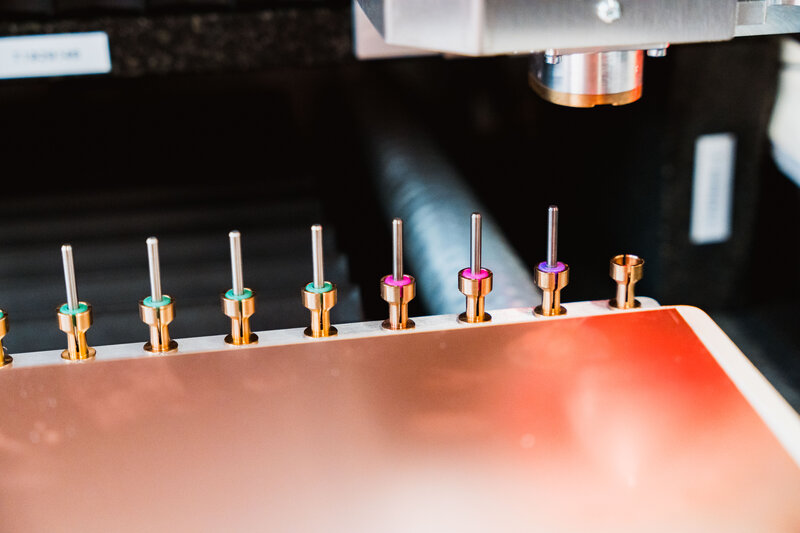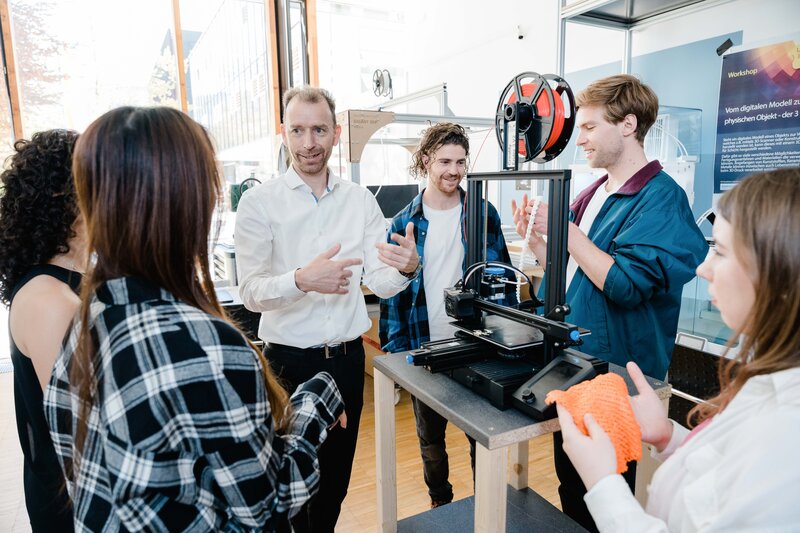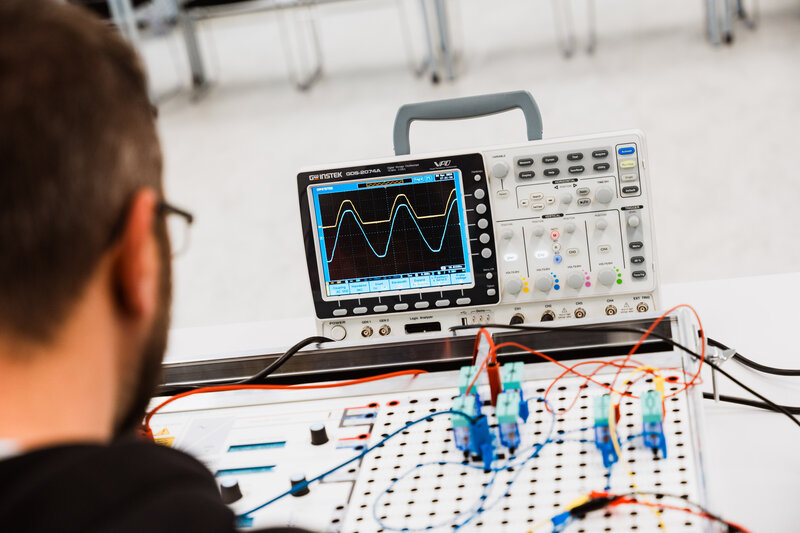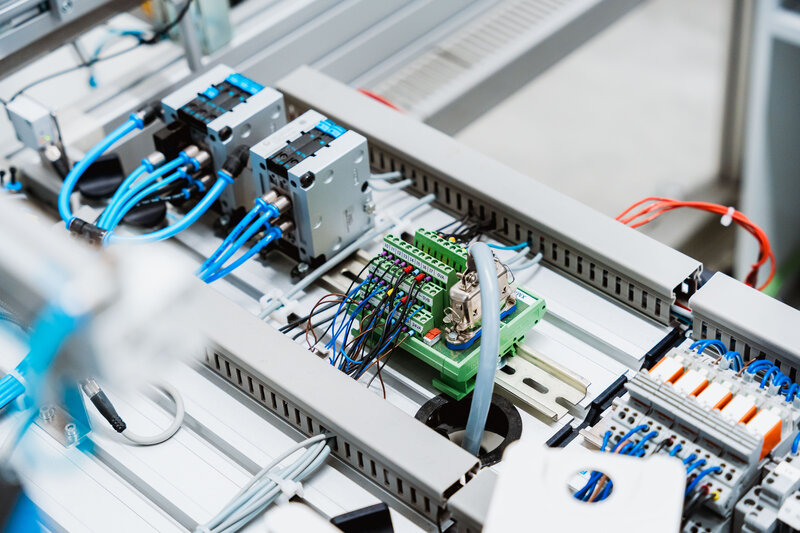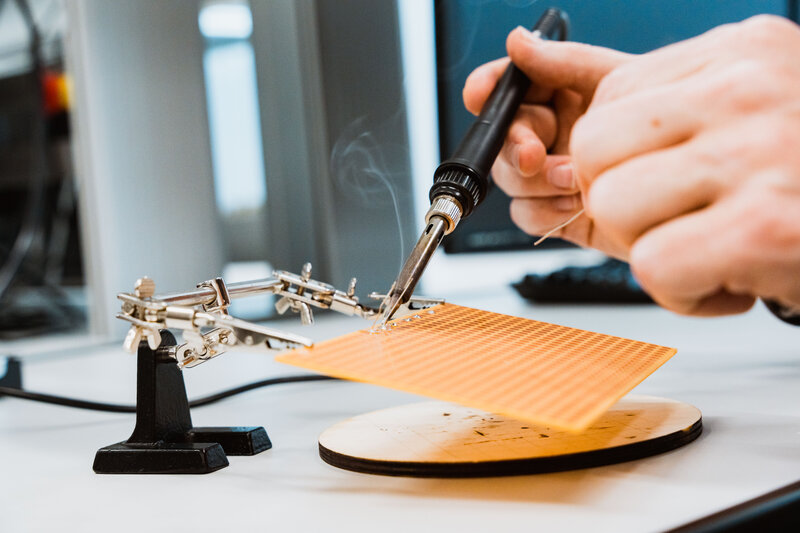Our full-time bachelor's program in Industrial Engineering blends technical expertise with economic knowledge, equipping you to tackle a wide range of challenges in the industry. Take the lead in shaping a dynamic future in both industry and business.

Industrial Engineering & Management
Bachelor's degree program
Overview
-
Qualification Level:
Stufe 1, Bachelor -
Price:
Euro 363,36* (excl. Student Union-fees) each semester -
Academic Degree:
Bachelor of Science in Engineering (BSc) -
Academic Program:
Full-time -
Language:
80 % German, 20 % English -
Remote Options:
E-Learning max. 30 % online -
Exchange Semester:
Organized stay abroad, 5th semester, internship in the 6th semester (also possible abroad)** -
Admission Requirements:
General study requirements -
Study Places per Year:
30
Study program accredited by the Agency for Quality Assurance and Accreditation Austria

Program Description
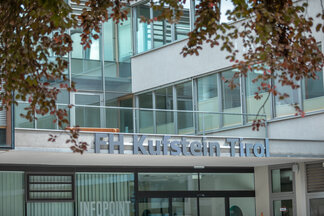


Are you looking for a program that will fully prepare you for the challenges of today's economy? Our Industrial Engineering program does just that. Bridging the gap between technology and business, you'll learn to solve complex problems in a goal-oriented manner, opening up a wide range of career opportunities.
Our bachelor's degree in industrial engineering places a strong emphasis on practical application. Students gain not only theoretical knowledge, but also the skills to apply it in real-world scenarios. Through projects, internships and collaborations with companies, students experience the realities of the workplace. From product development to production process optimization, they learn to create effective solutions to complex challenges such as sustainability and digitalization at the intersection of technology and business. With this hands-on experience, graduates can look forward to excellent job prospects in the job market.
Study Focus
-
44 %
Engineering science
-
16 %
international skills
-
13 %
Specialization in elective subject
-
11 %
Business & management
-
10 %
Social skills
-
6 %
Practical knowledge transfer
What You Will Learn
-
Technical and economic fundamentals; understanding technical terms
-
Analysing, finding amd implementing solutions
-
Getting to know the company, understanding the functions.
-
Organizing projects and managing them economically
-
Designing machines with electronics and computer science
-
Understanding the product life cycle, from idea to repair
-
Automating, organizing, and managing production
Popular Occupational Fields
- Product development, design
- Production planning, control
- Logistics, supply chain management
- Controlling, business organization
- Product, innovation & technology management
- Marketing, sales
- Procurement, purchasing
- Consulting
Career Opportunities
-
Project management
Managing projects for the efficient realization of corporate objectives
-
Product development & design
Design and optimize innovative products and processes
-
Production
Optimization of manufacturing processes for maximum efficiency and quality
-
Purchasing, Logistics
Procurement and optimal supply chain management
-
Finance, Controlling
Analysis and optimization of financial processes and resources
-
Consulting
Consultancy services to companies to improve their performance and efficiency
-
Management functions
Assuming responsibility in leading positions in professional life
The path to the Bachelor's Degree
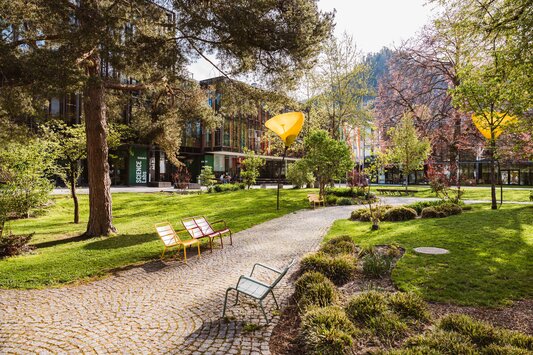
The degree program starts with a comprehensive foundation in engineering and economics, followed by hands-on projects and lab work. Beginning in the third semester, students select a specialization. In the fifth semester, students can spend time abroad, with the option to earn an additional academic degree from one of our partner universities, enriching their overall experience.
Special features:
-
Specializations: product development, organization & management
-
Direct entry for HTL or FOS graduates
-
Dual degrees possible
Recognition of Prior Learning
Students from selected higher technical colleges (HTL) in the following fields of study can start directly in the 3rd semester and shorten their study period accordingly:
- Mechanical engineering
- Electrical engineering
- Mechatronics
- Production technology
- Technical computer science, business informatics
- Industrial Engineering
Non-substitutable courses (e.g. pieces of academic writing, foreign languages) can be completed during the 3rd and 4th semester.
To apply for credit, students must submit a request directly to the Director of Studies.
Director of Studies

Prof. (FH) Dr. Martin Adam
Director of Studies Bachelor Drone Engineering, Industrial Engineering & Management | Master ERP-Systems & Business Process Management, Master Smart Products & AI-driven Development
Curriculum
• Practical design exercises using practical examples, in particular for the design of factory units, conveyor systems, machines and systems. Elements of machine components and conveyors are particularly noteworthy for the interaction:
• Business processes and their interaction (sales, purchasing, production, HR, finance, ..) and best practice processes
• All elements that are also relevant for the connections and conveyor technology
• Factory Optimization and layout supported by elements of digitalization and Industry 4.0. Above all, automated guided vehicles.
• Agile factory methodologies and tools
• Best Practice Processes and KPIs for Production
• Product Lifecycle Management
• Production planning and control
• Corporate Structures and Master Data Structures
• Support by ERP (Enterprise Resource Planning) systems
• Integration of SCM (Supply Chain Management) and CRM (Customer Relations Management) with production and MES systems
• Support methods for optimizing production through information systems, including web applications and mobile devices
• E-skills: e-marketing mix, e-procurement, e-commerce
• Organizational requirements for digital and online processes
• Analysis and optimization of processes and key figures in e-business
• Use of appropriate tools and methods to gain insights and identify potential for improvement
• Core processes in the production area
• Challenges in the production area against the background of existing market requirements
• Levels of production management (strategic, tactical, operational) such as location decision, in-house/third-party production, order management, work system design, production planning and control (PPS), personnel management
• Lean Management
• Interaction between man and machine
• Management of the production area with qualitative and quantitative approaches (QM approaches)
• Definition and characteristics of leadership
• Overview of Leadership Theories, Leadership: Performance; leadership success; leadership efficiency; Leadership Effectiveness
• The implementation of leadership approaches in organizations will be discussed and reflected on the basis of case studies
• Motivating work design (Job Rotation, Job Enlargement, Job Enrichment)
• Modern working world and digitalization
Current, influential trends will be presented and discussed in this course. This ensures that students have their finger on the pulse of the times with their respective specializations.
• Best Practices and Impact of Global Requirements
• Changes brought about by new integrated global networks, technological developments
• Current organizational forms (e.g. hybrid, fluid)
• New Work Models
• Sustainability management
• Circular economy
To prepare the students optimally for problems in working life, practical tasks are worked on in groups, preferably on the basis of commissions from partners from industry or public institutions, or field experiences are obtained under the guidance of the course leader. The students contribute their acquired knowledge and compare it with observations and experiences in the context of the practical project. While students can deepen and improve their subject-specific competences, complementary competences such as social competence, risk management, budgeting competence and economically responsible decision-making competence are also solidified.
Based on a client briefing (by the course instructor or external partners such as associations and companies), the students work on the presented projects independently, only guided by the course instructor if necessary: Planning, coordination, budgeting, control, evaluation and final reporting are in the hands of the students. The role of the course leader is focused on project coaching. Practical project I or II must process a technical topic
Building on the experience gained in the practical project I and on the further knowledge and skills acquired in specialist teaching events, the students have the opportunity to apply their acquired knowledge to real projects - above all, the competences in the area of project and quality management, as well as the subject-specific problem-solving competence, are to be consolidated and made applicable in this way. In cooperation with companies or other institutions, problems from the areas of the study course are dealt with within the framework of projects. The planning, implementation, budgeting and evaluation of the projects are carried out independently - both the formation of the project team and the implementation of quality management are carried out by the students themselves in order to promote decision-making competence and communicate real consequences. Practical project I or II must process a technical topic.
• Writing an outline for the Bachelor thesis
• Setting up the structure for the Bachelor thesis
• Research of relevant literature for the selected topic of the Bachelor thesis (physical and digital literature search)
• Development and implementation of a research design
• Writing an academically oriented Bachelor thesis
• Supplementing the theoretical knowledge of the students with practical activities and questions of commercial law in practice.
• At least 600 working hours at an external company with full employment.
• The internship ensures that the students navigate their way into their professional life and gain confidence in the implementation of their acquired knowledge through the experience they have already gained.
• Processes, workflows and situations in the professional environment should be learned and understood.
• Support of the students during their internship: Reflection, discussion of problems and success stories.
Practical design and calculation exercises using practical examples, in particular for the design of simple connecting elements, axles and shafts, as well as sliding and rolling bearing technology, shaft-hub connections, couplings, belt drives and gear drives, elements for supporting, carrying machine components and torque transmission:
• Functions and design rules as well as calculation bases for axes and shafts
• Design fundamentals and calculation bases of hydrodynamic plain bearings
• Bearing types, areas of application, bearing concepts and calculation bases for rolling bearings
• Elements for sealing machine components
• Elastic springs: Spring types, design rules and calculation bases for springs
• Clutches and brakes: Design, functions, mode of operation and calculation bases of selected clutch and brake types
• Belt drives: Design principles and calculation bases for flat and V-belt drives and timing belt drives
• Gear drives: Gear types and design, gearing law, design and calculation bases for straight, helical, bevel and helical gears
• Core processes in the development area
• Challenges in the development area against the background of existing market requirements
• Levels of development management (strategic, tactical, operational)
• Management of the development area with qualitative and quantitative approaches (Lean Engineering, Model Based System Engineering). QM etc.)
• Best practice processes and KPIs for product development
• Authorization concept
• Product lifecycle management
• Product data management (PDM) - various systems
• Interfaces CAD, PDM, PLM and ERP
• Product development system, Windchill
• Production planning and control
• Support through ERP Enterprise resource planning systems
• Special features of SCM Supply Chain Management during product development
• Influence of customers on product development viewed under consideration of Customer Relation Management (CRM)
• Effects of integration and networking on product development (smart products)
• Application integration, long-term archiving
• Methods of structured development of products using modern tools
• Product development process and effects on it through global requirements
• Changes in the product development process through new integrated, global networks, technical developments (e.g. sensor technology, web, mobile devices, smart devices, ...)
• State of the art methods of product development
• Fundamentals of innovation in product development
• Current, influential trends in product development are presented and discussed in this course. This ensures that the students have their finger on the pulse of the times with their respective specialization.
• Presentation and lecture techniques
• Structure and arrangement of presentations
• Use of media for presentations
• Exercises and video analysis
The language modules integrated into the degree program curriculum are designed according to the methodological principles of a communicative, action-oriented approach.
The competence levels of the modules are based on the Common European Framework of Reference for Languages (CEFR), and a central objective is that students increase their communication skills by at least one level.
In addition, there is a clear focus on acquiring academic and business-oriented skills in the target language.
• A1-A2 Basic communication skills
• B1-B2 Advanced use of the language and communication skills
• B2-C1 Independent language use to expert communication skills
• C1-C2 Expert language skills to fluent, competent communication skills
• Presentation and lecture techniques
• Structure and arrangement of presentations
• Use of media for presentations
• Exercises and video analysis
The language modules integrated into the degree program curriculum are designed according to the methodological principles of a communicative, action-oriented approach.
The competence levels of the modules are based on the Common European Framework of Reference for Languages (CEFR), and a central objective is that students increase their communication skills by at least one level.
In addition, there is a clear focus on acquiring academic and business-oriented skills in the target language.
• A1-A2 Basic communication skills
• B1-B2 Advanced use of the language and communication skills
• B2-C1 Independent language use to expert communication skills
• C1-C2 Expert language skills to fluent, competent communication skills
• In the introductory course on academic research, the main aim is to familiarize students with the special features, rules and principles of science and academic research. The focus here is on learning hermeneutic text analysis to control team processes; basic elements of moderation
• Students are prepared to write seminar papers independently and at a high academic level. This preparation includes a focus on dealing with literature as well as discussions about the quality of academic research - especially the concepts of intellectual honesty and intersubjective comprehensibility.
Consolidation through courses such as Business Communication, Negotiation and Conflict Resolution, International Business Communication, Bargaining Behavior.
Introduction and basic terms
• Basic laws of electrical engineering
• Sources of voltage and current
• Basic circuits
• Electric field and capacitor
• Magnetic field and coil
• Circuit technology
• Alternating current and three-phase current technology
• Electrical installations and machines
• Protective measures
• Fundamentals of electronic components
Fundamentals of technical communication:
• Preparation of workpiece drawings with standard-compliant view arrangement, cuts, dimensions, surface and tolerance specifications, workpiece details
• Creation of parts lists and interpretation of exploded drawings
• Standard-compliant representation of basic machine elements:
• Representation of threads, countersinks
• Representation of screw, bolt and pin connections
• Representation of shaft-hub connections, bearings, gear wheels
CAX:
• Function structure of the menu bars
• Sketch mode, dimensions and relationships
• Volume features such as rotation, extrusion, discharging
• Patterns, chamfers, curves, walls etc.
• Assembly design, links
• Integration of local standard parts libraries and parts from online catalogs
• Hands-on practical examples
• Standard-compliant drawing derivations
Tolerances and fits:
• Basic concepts of tolerances and fits
• Tolerance and fit selection, tolerance systems
Fundamentals of the calculation methods:
• Simple stress types: Tensile and compressive stress, surface pressure, bending and torsion
• Static and dynamic stress types
• Durability and design strength, permissible stresses and safety
Connecting elements in mechanical engineering:
• Functions and design variants of bolts, pins, screws and rivets
• Fundamentals of soldering, gluing and welding connections
• Design rules and calculation bases for feather keys, spline shafts, polygon connections, serrations, press fits, clamping and spline connections, clamping element connections
• Equations: linear, quadratic, system of linear equations, matrices and determinants
• Functions: Linear functions, polynomials, trigonometric functions, exponential functions and logarithms
• Vector calculus
• Differential calculus in a variable: Derivation rules, curve discussions, extreme value tasks, Taylor series, Newton methods
• Integral calculation in one variable: Fundamental theory of integral calculus, integration techniques
• Power systems and balance on the rigid body
• Bearing reactions, focus
• Rod, beam, frame - internal forces
• Level framework
• Adhesion and friction on machine parts
• Stress types: Tension/compression, shear, surface pressure, moment of area and resistance, bending, torsion
• Change of shape
• General information about forces; breakdown, resultant, reduction, moment of a force, distributed forces
• Cutting methods, equilibrium in central and general force groups
• Coulomb friction
• Center of gravity & area torques
• Internal forces on rod and beam
• Stress state, principal stresses, Hooke’s law
• Tensile/compressive stresses, shear stresses, bending stresses, torsion, deformations
• Strength hypotheses, composite loading
• Measurement of current, voltage and resistance
• Interpretation of the fundamental electrotechnical laws
• Series and parallel connection
• Capacitor and coil in AC circuit
• Use and switching of electrical equipment and electrical machines
• Structure of basic logic functions with integrated circuits (IC)
• Electronic components
Dynamics component:
• Kinematics of the mass point; description of the movement of the mass point, velocity, acceleration, relative movement
• Kinetics of the mass point; Newtonian law, momentum theorem, spin theorem, energy conservation theorem
• Kinematics and kinetics of the rigid body: Kinematics of the general motion of a rigid body, mass moment of inertia, impulse theorem, twist theorem, energy conservation theorem, systems of rigid bodies
• Impact processes; straight central impact, eccentric impact
• Vibrations; classification of vibrations, free and forced vibrations, damped and undamped vibrations, resonance
Hydromechanics component:
• Substance properties of liquids and gases
• Hydrostatic pressure
• Buoyancy
• Equation of continuity
• Energy equation
• Pipe hydraulics
• Outflow from containers
• Principle of linear momentum
• Principle of angular momentum
• Laws of similarity
• Introduction to programming languages (classification, principles, history)
• Teaching skills for procedural and object-oriented programming using C# as an example
• Structure of programs, data types, operators
• Structured programming, functions, file handling, modularization
• Aspects of the software development process (conception, implementation, test, introduction)
• References to industrial engineering-specific application fields (e.g. programmable control and regulation systems)
Differential calculus in several variables: Extreme value tasks with and without constraints
technical applications, nonauthentic integrals, numerical integration
Complex numbers and functions
Important differential equations (DGI):
General information about linear and nonlinear DGI, DGI 1st order with separated variables, linear DGI 1st order with constant coefficients and technical applications, linear DGL 2nd order with constant coefficients and vibration problems
Production engineering:
• Overview of manufacturing processes in the fields of prototyping, forming, separating, joining, changing material properties and coating
• Machining: Turning, milling, drilling, grinding
• Beam cutting by oxy-fuel flame cutting, plasma beam, electron beam, laser beam and water beam cutting
• Cutting with cutting tools with progressive and complete cutting tools
• Prototypes: Casting with lost molds and with permanent molds, sintering
• Forming: Forging, rolling, sheet metal working by bending, deep drawing, bending
• Joining: Welding, soldering and adhesive technology
• Changing substance properties: Annealing, hardening, tempering and tempering
• Basic design of machine tools and manufacturing equipment for different machining processes
• Practically relevant determination of key production figures for various manufacturing processes
• Metrology
Production engineering:
• Manual and automated handling technology in the production area, in the special construction, programming and application areas of industrial robots
• Fundamentals of fixture construction: Positioning, clamping devices and additional functions of turning, milling, drilling and welding devices
• Processes and methods for increasing productivity by optimizing the cutting values
• Procedures and methods for quality assurance and improvement as well as for ongoing quality control in the production area
• Work planning:
• Tasks of work planning
• Schedule creation
• Materials engineering:
• Internal structure of metallic materials and plastics
• Basic principles of alloy formation and description using phase diagrams
• Properties of iron and iron alloys and of selected non-ferrous metals
• Properties, characteristics and applications of important steel groups, non-ferrous metals and plastics
• Methods of static and dynamic material testing
EElements for supporting and carrying machine components and for torque transmission:
• Functions and design rules as well as calculation bases for axes and shafts
• Design fundamentals and calculation bases of hydrodynamic plain bearings
• Bearing types, areas of application, bearing concepts and calculation bases for rolling bearings Elements for sealing machine components
Elastic springs:
• Spring types, design rules and calculation bases for springs
Clutches and brakes:
• Design, functions, mode of operation and calculation bases of selected clutch and brake types
Belt drives:
• Design principles and calculation bases for flat and V-belt drives and timing belt drives
Gear drives:
• Gear types and design, gearing law, design and calculation bases for straight, helical, bevel and helical gears
• Positioners and actuators in pneumatics, electropneumatics, hydraulics and electrical engineering
• Path-step diagram (state diagram)
• Sensor technology and data acquisition
• Measuring non-electrical quantities
• Binary, digital and analog signals
• Basic knowledge of digital control technology (SPS)
• Control design
• Disjunctive and conjunctive normal form
• Basic logical functions
• Basic knowledge of control engineering and control algorithms
• Concepts and applications of bus systems
• Principle of automation technology
• Overview of robotic systems
Statistics:
Descriptive Statistics: Characteristics, frequency, mean values, scatter measures, regression, correlation, time series
Inductive statistics: Elements of probability theory, random variables and their distribution, forecasting, estimation methods, hypothesis tests
• Main theorems of thermodynamics
• Equation of state and change of state of ideal gases
• Cyclic processes
• Water and steam
• Thermal machines
• Heat transfer, combustion
• Fundamentals of information systems incl. economic aspect
• Understanding and differentiating the structure of information systems
• Identification of interfaces to mobile devices as well
• Cloud computing
• Technical structure and history; networks, interfaces
• Structure and logical structure of programs and overview of programming languages e.g. web programming
• Data security
• Hardware software components
• Reporting
• Permissions
• Testing
• Technical design of systems, sensors and mobile terminals
• Design of pneumatic, electropneumatic and hydraulic circuits
• Recording measured values
• Measurement of non-electrical quantities such as temperature, pressure, speed, sound level, frequency
• Measured value transmission
• Programming of control units (SPS)
• Structure of control transmission elements
• Industrial bus systems and robot systems
• Power and working machines, classification and history
• Hydropower plants: Low, medium and high pressure plants, Hydropower machines
• Pumps: Displacement, centrifugal and vacuum pumps. Pump systems
• Thermal plants: Steam generators, steam and gas turbines, power plant construction forms
• Compressors: Compressors with displacement effect, turbo compressors
• Internal combustion engines: Two-stroke and four-stroke, petrol and diesel engines.
• Conveying systems: Lifting machines (winches, cranes, elevators), continuous conveyors and floor conveyors
• ERP lifecycle management
• ERP enterprise resource planning
• SCM supply chain management
• CRM (customer relation management)
• Production planning and control
• Application integration, long-term archiving
• PDM (Product data management)
• PLM (Product Lifecycle Management)
• Tools for industrial design
• Innovation management
• Reverse engineering / surface reconstruction
• Rapid prototyping, rapid tooling, rapid manufacturing
• CAD (computer aided design)
• PDM (Product data management)
• Simulation and analysis technologies
• CAM (computer aided manufacturing)
• Interfaces in the manufacturing process
• Quality assurance
Consolidation through courses in the following two areas:
1. Higher engineering science (e.g. fluid mechanics, heat transfer, machine dynamics, multi-body dynamics, modelling and simulation, higher strength, quality assurance, corrosion and corrosion protection, composite materials, welding, metrology, forming technology, foundry technology, joining technology, etc.)
2. Product development (e.g. mechatronic systems, internal combustion engines, drive and control technology, thermal turbomachinery, hydraulic fluid machines, robotics, plant simulation, etc.)
• Presentation of the specifics of the project organization and the organizational integration into, impact on, or resulting problems in companies.
• Imparting basic project management methods, such as
• Planning of goals, structure, time, costs and organization
• Performing environment, risk and interdependency analyses or project controlling/communication in the various phases of projects (start, implementation/controlling, conclusion) on the basis of a selected project management standard.
• Addressing the relevant social skills for successful project work and the mediation of successful practical projects and typical pitfalls.
• Classification of the terms project management, program management and multi-project management.
External accounting:
• Structure of the accounting system
• Fundamentals of operational accounting: Tasks, subareas and basic terms
• Commercial accounting system: From inventory to opening balance sheet
• Double-entry accounting system: Posting of business cases to balance sheet and profit and loss accounts
• Organization of bookkeeping (chart of accounts, sales tax, etc.)
• Principle of period specificity and accruals and deferrals
Internal accounting:
• Objectives and basic concepts of cost and revenue accounting
• Fundamentals of cost and revenue accounting: Tasks, components and subareas
• Structure of cost accounting (cost elements, cost centers, cost objects)
• Contribution margin accounting
• Fundamentals of law
• History of law, significance of law, structure of the legal system, classification of law
• General private law
• Classification of private law, legal entities and legal objects, time, introduction to property law, legal transaction, contract law
• Commercial law
• Entrepreneur status, company register, forms of enterprise, establishment of an enterprise
• European law
• EU institutions, EU legal sources, fundamental freedoms of the internal market
• Technology law
• CE marking, intellectual property (IP) law
• Access to legal information systems
• Importance and tasks of marketing in the 21st century
• Fundamentals of capital goods, consumer goods and services marketing
• Marketing plan
• Market research
• Market segmentation/positioning
• Strategic marketing
• Marketing mix
Introduction to Business Administration component:
• Overview and context analysis of the most important subareas in business administration
• Subject and fundamentals of business administration:
• Operational functional areas
• Business decision theory
• Fundamentals of management and ethics
• Fundamentals of personnel and organization
• Marketing Fundamentals
• Fundamentals of:
• Constitutive company decisions such as legal forms, location decisions, types of mergers and acquisitions and choice of business segment.
• Functional business decisions: Materials management, production management, marketing.
• Fundamentals of business value creation processes and functions (value creation architecture and structure).
• Fundamentals of market, process and strategy oriented management.
Applied Economics component:
• Economic thinking and marginal analysis
• Efficient allocation of scarce resources
• The market model and market equilibrium
• Macroeconomic variables (GDP, inflation, and unemployment) and their interrelationships
Selected macroeconomics issues:
• Elasticity and welfare
• Cost functions and optimal corporate production
• Price setting and market structures
• Short-term macroeconomic fluctuations: The business cycle
• Money, the ECB, and inflation
• Long-term economic growth
• International relations and trade
• Introduction to financial management
• Economic business processes (investment, financing and risk management)
• Differences in financing needs for: Enterprises, public budgets and private budgets
• Structure and legal basis of the credit business of credit institutions
• Supply of credit to the credit markets
• The European Central Bank
• Execution and processing of credit transactions, e.g. credit types
• Company assessment and analysis
• Collateral, credit agreement and credit decisions
• Introduction to investment calculation
• Goals and tasks of a modern investment calculation
• Fundamentals of business investment decisions
• Static methods of investment calculation
• Dynamic methods of investment calculation
The course aims to introduce the subject of logistics, the scope, areas and value of which cover the globalized and networked economy on a strategic and operational level.
• Goals and conflicting goals in logistics against the background of the following framework conditions
• Levels of logistics (functional service function, coordination, flow rationing, supply chain)
• Storage/warehousing
• Demand planning
• Internal and external transport
• ABC/XYZ analysis
• Approaches like Kanban, JIT/JIS, value stream analysis
• Order picking
• Types of order control
• Procurement, production, distribution and disposal logistics
• Supply chain management
• Procurement, production, distribution and disposal logistics
• Supply chain management
• Strategic relevance of innovation (competitiveness)
• Structured handling of innovations (innovation-promoting organizational forms, corporate culture, management forms)
• Importance of product development for companies
• Scope and integration of product development in companies
• Design forms of the product development process and organizational forms
• Approaches in product development with regard to concept, concept and elaboration such as functional analysis, QFD, specification, FMEA, concept evaluation (quality approaches) and production transition
• Variant management and approaches for the representation of external complexity
• Management of target costs
Consolidation through courses in the following three areas:
1. Management (e.g. Strategic Management, Competitive Strategies, Management of Multinational Corporations, Organizational Theory, Corporate Behavior, Corporate Culture, Knowledge Management, Management of Innovations, Business Ethics, Corporate Governance, Managerial Decision Behavior, HRM, Leadership, Quality, etc.)
2. Marketing/Sales (e.g. Advanced Marketing Management, Consumer Behavior, Customer Service Excellence, Global Marketing, Sales Management, Sales Techniques etc.)
3. Accounting/Finance/Controlling/Purchasing (e.g. Financial Management, Portfolio Management, Options and Futures, International Finance, Global buying, Buying, E-Procurement etc.)
4. Law (e.g. patent law, product labelling, product liability, etc.)
• Presentation and lecture techniques
• Structure and arrangement of presentations
• Use of media for presentations
• Exercises and video analysis
The language modules integrated into the degree program curriculum are designed according to the methodological principles of a communicative, action-oriented approach.
The competence levels of the modules are based on the Common European Framework of Reference for Languages (CEFR), and a central objective is that students increase their communication skills by at least one level.
In addition, there is a clear focus on acquiring academic and business-oriented skills in the target language.
• A1-A2 Basic communication skills
• B1-B2 Advanced use of the language and communication skills
• B2-C1 Independent language use to expert communication skills
• C1-C2 Expert language skills to fluent, competent communication skills
Introduction and basic terms
• Basic laws of electrical engineering
• Sources of voltage and current
• Basic circuits
• Electric field and capacitor
• Magnetic field and coil
• Circuit technology
• Alternating current and three-phase current technology
• Electrical installations and machines
• Protective measures
• Fundamentals of electronic components
Fundamentals of technical communication:
• Preparation of workpiece drawings with standard-compliant view arrangement, cuts, dimensions, surface and tolerance specifications, workpiece details
• Creation of parts lists and interpretation of exploded drawings
• Standard-compliant representation of basic machine elements:
• Representation of threads, countersinks
• Representation of screw, bolt and pin connections
• Representation of shaft-hub connections, bearings, gear wheels
CAX:
• Function structure of the menu bars
• Sketch mode, dimensions and relationships
• Volume features such as rotation, extrusion, discharging
• Patterns, chamfers, curves, walls etc.
• Assembly design, links
• Integration of local standard parts libraries and parts from online catalogs
• Hands-on practical examples
• Standard-compliant drawing derivations
Tolerances and fits:
• Basic concepts of tolerances and fits
• Tolerance and fit selection, tolerance systems
Fundamentals of the calculation methods:
• Simple stress types: Tensile and compressive stress, surface pressure, bending and torsion
• Static and dynamic stress types
• Durability and design strength, permissible stresses and safety
Connecting elements in mechanical engineering:
• Functions and design variants of bolts, pins, screws and rivets
• Fundamentals of soldering, gluing and welding connections
• Design rules and calculation bases for feather keys, spline shafts, polygon connections, serrations, press fits, clamping and spline connections, clamping element connections
• Equations: linear, quadratic, system of linear equations, matrices and determinants
• Functions: Linear functions, polynomials, trigonometric functions, exponential functions and logarithms
• Vector calculus
• Differential calculus in a variable: Derivation rules, curve discussions, extreme value tasks, Taylor series, Newton methods
• Integral calculation in one variable: Fundamental theory of integral calculus, integration techniques
• Power systems and balance on the rigid body
• Bearing reactions, focus
• Rod, beam, frame - internal forces
• Level framework
• Adhesion and friction on machine parts
• Stress types: Tension/compression, shear, surface pressure, moment of area and resistance, bending, torsion
• Change of shape
• General information about forces; breakdown, resultant, reduction, moment of a force, distributed forces
• Cutting methods, equilibrium in central and general force groups
• Coulomb friction
• Center of gravity & area torques
• Internal forces on rod and beam
• Stress state, principal stresses, Hooke’s law
• Tensile/compressive stresses, shear stresses, bending stresses, torsion, deformations
• Strength hypotheses, composite loading
• Measurement of current, voltage and resistance
• Interpretation of the fundamental electrotechnical laws
• Series and parallel connection
• Capacitor and coil in AC circuit
• Use and switching of electrical equipment and electrical machines
• Structure of basic logic functions with integrated circuits (IC)
• Electronic components
• Presentation and lecture techniques
• Structure and arrangement of presentations
• Use of media for presentations
• Exercises and video analysis
The language modules integrated into the degree program curriculum are designed according to the methodological principles of a communicative, action-oriented approach.
The competence levels of the modules are based on the Common European Framework of Reference for Languages (CEFR), and a central objective is that students increase their communication skills by at least one level.
In addition, there is a clear focus on acquiring academic and business-oriented skills in the target language.
• A1-A2 Basic communication skills
• B1-B2 Advanced use of the language and communication skills
• B2-C1 Independent language use to expert communication skills
• C1-C2 Expert language skills to fluent, competent communication skills
• In the introductory course on academic research, the main aim is to familiarize students with the special features, rules and principles of science and academic research. The focus here is on learning hermeneutic text analysis to control team processes; basic elements of moderation
• Students are prepared to write seminar papers independently and at a high academic level. This preparation includes a focus on dealing with literature as well as discussions about the quality of academic research - especially the concepts of intellectual honesty and intersubjective comprehensibility.
Dynamics component:
• Kinematics of the mass point; description of the movement of the mass point, velocity, acceleration, relative movement
• Kinetics of the mass point; Newtonian law, momentum theorem, spin theorem, energy conservation theorem
• Kinematics and kinetics of the rigid body: Kinematics of the general motion of a rigid body, mass moment of inertia, impulse theorem, twist theorem, energy conservation theorem, systems of rigid bodies
• Impact processes; straight central impact, eccentric impact
• Vibrations; classification of vibrations, free and forced vibrations, damped and undamped vibrations, resonance
Hydromechanics component:
• Substance properties of liquids and gases
• Hydrostatic pressure
• Buoyancy
• Equation of continuity
• Energy equation
• Pipe hydraulics
• Outflow from containers
• Principle of linear momentum
• Principle of angular momentum
• Laws of similarity
• Introduction to programming languages (classification, principles, history)
• Teaching skills for procedural and object-oriented programming using C# as an example
• Structure of programs, data types, operators
• Structured programming, functions, file handling, modularization
• Aspects of the software development process (conception, implementation, test, introduction)
• References to industrial engineering-specific application fields (e.g. programmable control and regulation systems)
Differential calculus in several variables: Extreme value tasks with and without constraints
technical applications, nonauthentic integrals, numerical integration
Complex numbers and functions
Important differential equations (DGI):
General information about linear and nonlinear DGI, DGI 1st order with separated variables, linear DGI 1st order with constant coefficients and technical applications, linear DGL 2nd order with constant coefficients and vibration problems
Production engineering:
• Overview of manufacturing processes in the fields of prototyping, forming, separating, joining, changing material properties and coating
• Machining: Turning, milling, drilling, grinding
• Beam cutting by oxy-fuel flame cutting, plasma beam, electron beam, laser beam and water beam cutting
• Cutting with cutting tools with progressive and complete cutting tools
• Prototypes: Casting with lost molds and with permanent molds, sintering
• Forming: Forging, rolling, sheet metal working by bending, deep drawing, bending
• Joining: Welding, soldering and adhesive technology
• Changing substance properties: Annealing, hardening, tempering and tempering
• Basic design of machine tools and manufacturing equipment for different machining processes
• Practically relevant determination of key production figures for various manufacturing processes
• Metrology
Production engineering:
• Manual and automated handling technology in the production area, in the special construction, programming and application areas of industrial robots
• Fundamentals of fixture construction: Positioning, clamping devices and additional functions of turning, milling, drilling and welding devices
• Processes and methods for increasing productivity by optimizing the cutting values
• Procedures and methods for quality assurance and improvement as well as for ongoing quality control in the production area
• Work planning:
• Tasks of work planning
• Schedule creation
• Materials engineering:
• Internal structure of metallic materials and plastics
• Basic principles of alloy formation and description using phase diagrams
• Properties of iron and iron alloys and of selected non-ferrous metals
• Properties, characteristics and applications of important steel groups, non-ferrous metals and plastics
• Methods of static and dynamic material testing
EElements for supporting and carrying machine components and for torque transmission:
• Functions and design rules as well as calculation bases for axes and shafts
• Design fundamentals and calculation bases of hydrodynamic plain bearings
• Bearing types, areas of application, bearing concepts and calculation bases for rolling bearings Elements for sealing machine components
Elastic springs:
• Spring types, design rules and calculation bases for springs
Clutches and brakes:
• Design, functions, mode of operation and calculation bases of selected clutch and brake types
Belt drives:
• Design principles and calculation bases for flat and V-belt drives and timing belt drives
Gear drives:
• Gear types and design, gearing law, design and calculation bases for straight, helical, bevel and helical gears
• Presentation of the specifics of the project organization and the organizational integration into, impact on, or resulting problems in companies.
• Imparting basic project management methods, such as
• Planning of goals, structure, time, costs and organization
• Performing environment, risk and interdependency analyses or project controlling/communication in the various phases of projects (start, implementation/controlling, conclusion) on the basis of a selected project management standard.
• Addressing the relevant social skills for successful project work and the mediation of successful practical projects and typical pitfalls.
• Classification of the terms project management, program management and multi-project management.
• Practical design exercises using practical examples, in particular for the design of factory units, conveyor systems, machines and systems. Elements of machine components and conveyors are particularly noteworthy for the interaction:
• Business processes and their interaction (sales, purchasing, production, HR, finance, ..) and best practice processes
• All elements that are also relevant for the connections and conveyor technology
• Factory Optimization and layout supported by elements of digitalization and Industry 4.0. Above all, automated guided vehicles.
• Agile factory methodologies and tools
Practical design and calculation exercises using practical examples, in particular for the design of simple connecting elements, axles and shafts, as well as sliding and rolling bearing technology, shaft-hub connections, couplings, belt drives and gear drives, elements for supporting, carrying machine components and torque transmission:
• Functions and design rules as well as calculation bases for axes and shafts
• Design fundamentals and calculation bases of hydrodynamic plain bearings
• Bearing types, areas of application, bearing concepts and calculation bases for rolling bearings
• Elements for sealing machine components
• Elastic springs: Spring types, design rules and calculation bases for springs
• Clutches and brakes: Design, functions, mode of operation and calculation bases of selected clutch and brake types
• Belt drives: Design principles and calculation bases for flat and V-belt drives and timing belt drives
• Gear drives: Gear types and design, gearing law, design and calculation bases for straight, helical, bevel and helical gears
To prepare the students optimally for problems in working life, practical tasks are worked on in groups, preferably on the basis of commissions from partners from industry or public institutions, or field experiences are obtained under the guidance of the course leader. The students contribute their acquired knowledge and compare it with observations and experiences in the context of the practical project. While students can deepen and improve their subject-specific competences, complementary competences such as social competence, risk management, budgeting competence and economically responsible decision-making competence are also solidified.
Based on a client briefing (by the course instructor or external partners such as associations and companies), the students work on the presented projects independently, only guided by the course instructor if necessary: Planning, coordination, budgeting, control, evaluation and final reporting are in the hands of the students. The role of the course leader is focused on project coaching. Practical project I or II must process a technical topic
• Positioners and actuators in pneumatics, electropneumatics, hydraulics and electrical engineering
• Path-step diagram (state diagram)
• Sensor technology and data acquisition
• Measuring non-electrical quantities
• Binary, digital and analog signals
• Basic knowledge of digital control technology (SPS)
• Control design
• Disjunctive and conjunctive normal form
• Basic logical functions
• Basic knowledge of control engineering and control algorithms
• Concepts and applications of bus systems
• Principle of automation technology
• Overview of robotic systems
Statistics:
Descriptive Statistics: Characteristics, frequency, mean values, scatter measures, regression, correlation, time series
Inductive statistics: Elements of probability theory, random variables and their distribution, forecasting, estimation methods, hypothesis tests
• Main theorems of thermodynamics
• Equation of state and change of state of ideal gases
• Cyclic processes
• Water and steam
• Thermal machines
• Heat transfer, combustion
• Fundamentals of information systems incl. economic aspect
• Understanding and differentiating the structure of information systems
• Identification of interfaces to mobile devices as well
• Cloud computing
• Technical structure and history; networks, interfaces
• Structure and logical structure of programs and overview of programming languages e.g. web programming
• Data security
• Hardware software components
• Reporting
• Permissions
• Testing
• Technical design of systems, sensors and mobile terminals
• Design of pneumatic, electropneumatic and hydraulic circuits
• Recording measured values
• Measurement of non-electrical quantities such as temperature, pressure, speed, sound level, frequency
• Measured value transmission
• Programming of control units (SPS)
• Structure of control transmission elements
• Industrial bus systems and robot systems
• Power and working machines, classification and history
• Hydropower plants: Low, medium and high pressure plants, Hydropower machines
• Pumps: Displacement, centrifugal and vacuum pumps. Pump systems
• Thermal plants: Steam generators, steam and gas turbines, power plant construction forms
• Compressors: Compressors with displacement effect, turbo compressors
• Internal combustion engines: Two-stroke and four-stroke, petrol and diesel engines.
• Conveying systems: Lifting machines (winches, cranes, elevators), continuous conveyors and floor conveyors
External accounting:
• Structure of the accounting system
• Fundamentals of operational accounting: Tasks, subareas and basic terms
• Commercial accounting system: From inventory to opening balance sheet
• Double-entry accounting system: Posting of business cases to balance sheet and profit and loss accounts
• Organization of bookkeeping (chart of accounts, sales tax, etc.)
• Principle of period specificity and accruals and deferrals
Internal accounting:
• Objectives and basic concepts of cost and revenue accounting
• Fundamentals of cost and revenue accounting: Tasks, components and subareas
• Structure of cost accounting (cost elements, cost centers, cost objects)
• Contribution margin accounting
• Core processes in the development area
• Challenges in the development area against the background of existing market requirements
• Levels of development management (strategic, tactical, operational)
• Management of the development area with qualitative and quantitative approaches (Lean Engineering, Model Based System Engineering). QM etc.)
• Core processes in the production area
• Challenges in the production area against the background of existing market requirements
• Levels of production management (strategic, tactical, operational) such as location decision, in-house/third-party production, order management, work system design, production planning and control (PPS), personnel management
• Lean Management
• Interaction between man and machine
• Management of the production area with qualitative and quantitative approaches (QM approaches)
• Definition and characteristics of leadership
• Overview of Leadership Theories, Leadership: Performance; leadership success; leadership efficiency; Leadership Effectiveness
• The implementation of leadership approaches in organizations will be discussed and reflected on the basis of case studies
• Motivating work design (Job Rotation, Job Enlargement, Job Enrichment)
• Modern working world and digitalization
• Best practice processes and KPIs for product development
• Authorization concept
• Product lifecycle management
• Product data management (PDM) - various systems
• Interfaces CAD, PDM, PLM and ERP
• Product development system, Windchill
• Production planning and control
• Support through ERP Enterprise resource planning systems
• Special features of SCM Supply Chain Management during product development
• Influence of customers on product development viewed under consideration of Customer Relation Management (CRM)
• Effects of integration and networking on product development (smart products)
• Application integration, long-term archiving
• Best Practice Processes and KPIs for Production
• Product Lifecycle Management
• Production planning and control
• Corporate Structures and Master Data Structures
• Support by ERP (Enterprise Resource Planning) systems
• Integration of SCM (Supply Chain Management) and CRM (Customer Relations Management) with production and MES systems
• Support methods for optimizing production through information systems, including web applications and mobile devices
• E-skills: e-marketing mix, e-procurement, e-commerce
• Organizational requirements for digital and online processes
• Analysis and optimization of processes and key figures in e-business
• Use of appropriate tools and methods to gain insights and identify potential for improvement
• Methods of structured development of products using modern tools
• Product development process and effects on it through global requirements
• Changes in the product development process through new integrated, global networks, technical developments (e.g. sensor technology, web, mobile devices, smart devices, ...)
• State of the art methods of product development
• Fundamentals of innovation in product development
• Current, influential trends in product development are presented and discussed in this course. This ensures that the students have their finger on the pulse of the times with their respective specialization.
Current, influential trends will be presented and discussed in this course. This ensures that students have their finger on the pulse of the times with their respective specializations.
• Best Practices and Impact of Global Requirements
• Changes brought about by new integrated global networks, technological developments
• Current organizational forms (e.g. hybrid, fluid)
• New Work Models
• Sustainability management
• Circular economy
Building on the experience gained in the practical project I and on the further knowledge and skills acquired in specialist teaching events, the students have the opportunity to apply their acquired knowledge to real projects - above all, the competences in the area of project and quality management, as well as the subject-specific problem-solving competence, are to be consolidated and made applicable in this way. In cooperation with companies or other institutions, problems from the areas of the study course are dealt with within the framework of projects. The planning, implementation, budgeting and evaluation of the projects are carried out independently - both the formation of the project team and the implementation of quality management are carried out by the students themselves in order to promote decision-making competence and communicate real consequences. Practical project I or II must process a technical topic.
• ERP lifecycle management
• ERP enterprise resource planning
• SCM supply chain management
• CRM (customer relation management)
• Production planning and control
• Application integration, long-term archiving
• PDM (Product data management)
• PLM (Product Lifecycle Management)
• Tools for industrial design
• Innovation management
• Reverse engineering / surface reconstruction
• Rapid prototyping, rapid tooling, rapid manufacturing
• CAD (computer aided design)
• PDM (Product data management)
• Simulation and analysis technologies
• CAM (computer aided manufacturing)
• Interfaces in the manufacturing process
• Quality assurance
• Fundamentals of law
• History of law, significance of law, structure of the legal system, classification of law
• General private law
• Classification of private law, legal entities and legal objects, time, introduction to property law, legal transaction, contract law
• Commercial law
• Entrepreneur status, company register, forms of enterprise, establishment of an enterprise
• European law
• EU institutions, EU legal sources, fundamental freedoms of the internal market
• Technology law
• CE marking, intellectual property (IP) law
• Access to legal information systems
• Importance and tasks of marketing in the 21st century
• Fundamentals of capital goods, consumer goods and services marketing
• Marketing plan
• Market research
• Market segmentation/positioning
• Strategic marketing
• Marketing mix
Introduction to Business Administration component:
• Overview and context analysis of the most important subareas in business administration
• Subject and fundamentals of business administration:
• Operational functional areas
• Business decision theory
• Fundamentals of management and ethics
• Fundamentals of personnel and organization
• Marketing Fundamentals
• Fundamentals of:
• Constitutive company decisions such as legal forms, location decisions, types of mergers and acquisitions and choice of business segment.
• Functional business decisions: Materials management, production management, marketing.
• Fundamentals of business value creation processes and functions (value creation architecture and structure).
• Fundamentals of market, process and strategy oriented management.
Applied Economics component:
• Economic thinking and marginal analysis
• Efficient allocation of scarce resources
• The market model and market equilibrium
• Macroeconomic variables (GDP, inflation, and unemployment) and their interrelationships
Selected macroeconomics issues:
• Elasticity and welfare
• Cost functions and optimal corporate production
• Price setting and market structures
• Short-term macroeconomic fluctuations: The business cycle
• Money, the ECB, and inflation
• Long-term economic growth
• International relations and trade
• Introduction to financial management
• Economic business processes (investment, financing and risk management)
• Differences in financing needs for: Enterprises, public budgets and private budgets
• Structure and legal basis of the credit business of credit institutions
• Supply of credit to the credit markets
• The European Central Bank
• Execution and processing of credit transactions, e.g. credit types
• Company assessment and analysis
• Collateral, credit agreement and credit decisions
• Introduction to investment calculation
• Goals and tasks of a modern investment calculation
• Fundamentals of business investment decisions
• Static methods of investment calculation
• Dynamic methods of investment calculation
The course aims to introduce the subject of logistics, the scope, areas and value of which cover the globalized and networked economy on a strategic and operational level.
• Goals and conflicting goals in logistics against the background of the following framework conditions
• Levels of logistics (functional service function, coordination, flow rationing, supply chain)
• Storage/warehousing
• Demand planning
• Internal and external transport
• ABC/XYZ analysis
• Approaches like Kanban, JIT/JIS, value stream analysis
• Order picking
• Types of order control
• Procurement, production, distribution and disposal logistics
• Supply chain management
• Procurement, production, distribution and disposal logistics
• Supply chain management
• Strategic relevance of innovation (competitiveness)
• Structured handling of innovations (innovation-promoting organizational forms, corporate culture, management forms)
• Importance of product development for companies
• Scope and integration of product development in companies
• Design forms of the product development process and organizational forms
• Approaches in product development with regard to concept, concept and elaboration such as functional analysis, QFD, specification, FMEA, concept evaluation (quality approaches) and production transition
• Variant management and approaches for the representation of external complexity
• Management of target costs
Consolidation through courses such as Business Communication, Negotiation and Conflict Resolution, International Business Communication, Bargaining Behavior.
Consolidation through courses in the following two areas:
1. Higher engineering science (e.g. fluid mechanics, heat transfer, machine dynamics, multi-body dynamics, modelling and simulation, higher strength, quality assurance, corrosion and corrosion protection, composite materials, welding, metrology, forming technology, foundry technology, joining technology, etc.)
2. Product development (e.g. mechatronic systems, internal combustion engines, drive and control technology, thermal turbomachinery, hydraulic fluid machines, robotics, plant simulation, etc.)
Consolidation through courses in the following three areas:
1. Management (e.g. Strategic Management, Competitive Strategies, Management of Multinational Corporations, Organizational Theory, Corporate Behavior, Corporate Culture, Knowledge Management, Management of Innovations, Business Ethics, Corporate Governance, Managerial Decision Behavior, HRM, Leadership, Quality, etc.)
2. Marketing/Sales (e.g. Advanced Marketing Management, Consumer Behavior, Customer Service Excellence, Global Marketing, Sales Management, Sales Techniques etc.)
3. Accounting/Finance/Controlling/Purchasing (e.g. Financial Management, Portfolio Management, Options and Futures, International Finance, Global buying, Buying, E-Procurement etc.)
4. Law (e.g. patent law, product labelling, product liability, etc.)
• Writing an outline for the Bachelor thesis
• Setting up the structure for the Bachelor thesis
• Research of relevant literature for the selected topic of the Bachelor thesis (physical and digital literature search)
• Development and implementation of a research design
• Writing an academically oriented Bachelor thesis
• Supplementing the theoretical knowledge of the students with practical activities and questions of commercial law in practice.
• At least 600 working hours at an external company with full employment.
• The internship ensures that the students navigate their way into their professional life and gain confidence in the implementation of their acquired knowledge through the experience they have already gained.
• Processes, workflows and situations in the professional environment should be learned and understood.
• Support of the students during their internship: Reflection, discussion of problems and success stories.
Study regulations to download
-
Industrial Engineering
in effect since October 11, 2023, start of study program from 2024/25
- All study regulations
Frequently Asked Questions
Are the labs free to use?
After an initial training session and the acquisition of a laboratory guide certificate, the laboratories can be used freely by students by appointment.
What is the benefit of a double degree?
Through appropriate cooperation with our partner universities, students can deepen their knowledge of additional subjects such as electrical engineering or mechanical engineering and obtain two academic degrees with a study period extended by one semester. The Bachelor of Science from FH Kufstein Tirol and the bachelor's degree from the partner university.
Where can I spend the semester abroad?
We have over 250 partner universities worldwide from which our students can choose. Some partner universities are particularly suitable for students from this degree program, as they offer further content and thus allow students to deepen their skills even further.
Can I work while studying?
Classroom teaching usually occurs from Monday to Friday, occasionally on Saturdays in blocked units. With a significant amount of self-study, students can manage their schedules independently and have the flexibility to work part-time in the industry.






